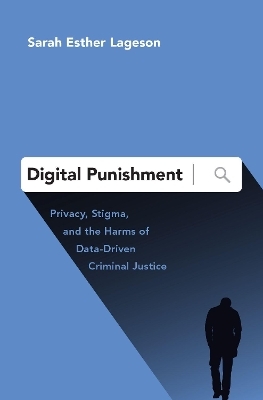
Digital Punishment
Privacy, Stigma, and the Harms of Data-Driven Criminal Justice
Seiten
2020
Oxford University Press Inc (Verlag)
978-0-19-087200-7 (ISBN)
Oxford University Press Inc (Verlag)
978-0-19-087200-7 (ISBN)
Data-driven criminal justice operations have led to the transformation of criminal records into millions of data points. These records are publicly disclosed on the internet, commodified into valuable big data, and leveraged against people. In Digitial Punishment, Sarah Lageson demonstrates the consequences this system has for people, society, and public policy.
The proliferation of data-driven criminal justice operations creates millions of criminal records each year in the United States. Documenting everything from a police stop to a prison sentence, these records take on a digital life of their own as they are collected by law enforcement and courts, posted on government websites, re-posted on social media, online news and mugshot galleries, and bought and sold by data brokers. The result is "digital punishment," where mere suspicion or a brush with the law can have lasting consequences.
In Digital Punishment, Sarah Esther Lageson unpacks criminal recordkeeping in the digital age, as busy and overburdened criminal justice agencies turned to technological solutions offered by IT companies over the last two decades. These operations produce a mountain of data, including the names, photographs, and home addresses of people arrested or charged with a crime, transforming millions of paper records into a digital commodity. Regardless of factual or legal guilt, these records rapidly multiply across the private sector background checking and personal data industries.
Emboldened by public records laws designed for paper-based systems, criminal record data has become an extremely valuable resource for employers, landlords, and communities to monitor criminal behavior and assess other people. But while transparency laws were originally designed to allow governmental watchdogging, digital punishment has redirected our gaze toward one another. Hundreds of interviews detailed in this book reveal the consequences of digital punishment, as people purposefully opt out of society to cope with privacy and due process violations. As criminal histories impact nearly every aspect of private and civic life, the collateral consequences of even the most minor records are much more than barriers to employment and housing. For the criminal record-holder, the messy entanglement of government bureaucracy is nothing compared to the jurisdiction-less haze of the internet.
Drawing on empirical data, interviews, and review of case law, this book powerfully demonstrates that addressing digital punishment will require a direct acknowledgement of privacy and dignity in the context of public accusation, and a reckoning of how rehabilitation can actually occur in a society that never forgets.
The proliferation of data-driven criminal justice operations creates millions of criminal records each year in the United States. Documenting everything from a police stop to a prison sentence, these records take on a digital life of their own as they are collected by law enforcement and courts, posted on government websites, re-posted on social media, online news and mugshot galleries, and bought and sold by data brokers. The result is "digital punishment," where mere suspicion or a brush with the law can have lasting consequences.
In Digital Punishment, Sarah Esther Lageson unpacks criminal recordkeeping in the digital age, as busy and overburdened criminal justice agencies turned to technological solutions offered by IT companies over the last two decades. These operations produce a mountain of data, including the names, photographs, and home addresses of people arrested or charged with a crime, transforming millions of paper records into a digital commodity. Regardless of factual or legal guilt, these records rapidly multiply across the private sector background checking and personal data industries.
Emboldened by public records laws designed for paper-based systems, criminal record data has become an extremely valuable resource for employers, landlords, and communities to monitor criminal behavior and assess other people. But while transparency laws were originally designed to allow governmental watchdogging, digital punishment has redirected our gaze toward one another. Hundreds of interviews detailed in this book reveal the consequences of digital punishment, as people purposefully opt out of society to cope with privacy and due process violations. As criminal histories impact nearly every aspect of private and civic life, the collateral consequences of even the most minor records are much more than barriers to employment and housing. For the criminal record-holder, the messy entanglement of government bureaucracy is nothing compared to the jurisdiction-less haze of the internet.
Drawing on empirical data, interviews, and review of case law, this book powerfully demonstrates that addressing digital punishment will require a direct acknowledgement of privacy and dignity in the context of public accusation, and a reckoning of how rehabilitation can actually occur in a society that never forgets.
Sarah Esther Lageson is a sociologist who studies criminal justice, law, privacy, and technology. Lageson is Assistant Professor at Rutgers University-Newark School of Criminal Justice, a recipient of the National Institutes of Justice Early Career Award, and an American Bar Foundation Faculty Scholar.
Introduction: Digital Punishment
Chapter 1: The Digital Turn
Chapter 2: Broken Records
Chapter 3: Selling Records
Chapter 4: The Digilantes
Chapter 5: Digital Degradation
Chapter 6: Mugged
Chapter 7: Laws
Conclusion: Forgiving and Forgetting
| Erscheinungsdatum | 29.06.2020 |
|---|---|
| Verlagsort | New York |
| Sprache | englisch |
| Maße | 236 x 163 mm |
| Gewicht | 522 g |
| Themenwelt | Recht / Steuern ► Allgemeines / Lexika |
| Recht / Steuern ► EU / Internationales Recht | |
| Recht / Steuern ► Strafrecht ► Kriminologie | |
| Recht / Steuern ► Strafrecht ► Strafverfahrensrecht | |
| ISBN-10 | 0-19-087200-4 / 0190872004 |
| ISBN-13 | 978-0-19-087200-7 / 9780190872007 |
| Zustand | Neuware |
| Haben Sie eine Frage zum Produkt? |
Mehr entdecken
aus dem Bereich
aus dem Bereich


